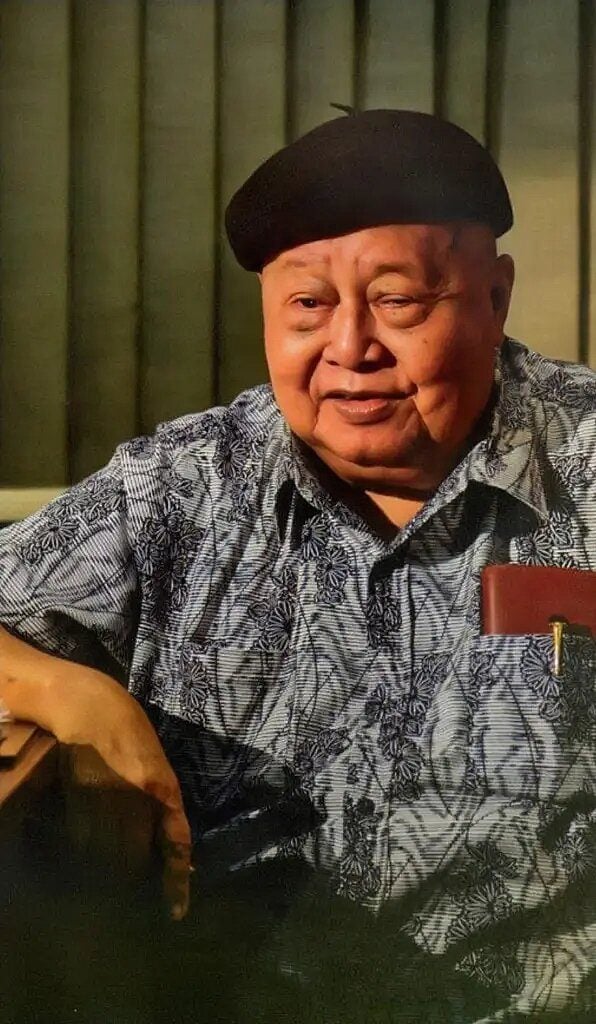Written by Franco Gargantiel II

Writer. Publisher. National Artist for Literature.
With his passing on January 6, 2021, the nation remembers and celebrates F. (Francisco) Sionil José and his legacy. His creative productions reflect the various social struggles the Filipino people have faced and continue to face—works that are proof of his tremendous impact on our country today and for years to come.
Sionil José was born on December 3, 1924, in Rosales, Pangasinan. At the renowned Faculty of Philosophy and Letters of the University of Santo Tomas, he studied Philosophy under Professor Ariston Estrada and Literature under pioneering fictionist Paz Latorena. Sionil José was UST Varsitarian editor in chief from 1948 to 1949.
While studying, he was a staff member of The Commonweal from 1947 to 1948 and Assistant Editor for the United States Information Service from 1948 to 1949. He was Managing Editor of The Manila Times Sunday Magazine from 1949 to 1960. Eventually, he became the Editor of Progress, an annual publication of The Manila Times and Comment, a quarterly journal.
Sionil José founded the Philippine Center of PEN International in 1957. In 1965, Sionil José and his wife, Teresita, founded the Solidaridad Bookshop and Publishing House in Ermita, Manila. In 1967, he established Solidarity, a journal that enabled writers, artists, politicians, scholars, and political and social activists from Asia and the Pacific region to share their works before a wider audience. In 1968, he founded Solidaridad Galleries, which provided young Filipino artists with opportunities to showcase their works.
José received Carlos Palanca Memorial Awards for “The God Stealer” (short fiction, 1959), “Waywaya” (short fiction, 1979), “Arbol de Fuego” (short fiction, 1980), “Tree” (novel, 1978), and “A Scenario for Philippine Resistance,” (essay,1979).
He also received the Ramon Magsaysay Award for Journalism, Literature, and Creative Communication Arts in 1980 and the Cultural Center of the Philippines (CCP) Centennial Honors for the Arts in 1999.
During its 1048th Meeting on March 26, 1992, the UP Board of Regents approved the conferment of Doctor of Humanities, honoris causa, on Sionil José.
He was named Philippine National Artist for Literature in 2001. In addition, he received the Order of Sacred Treasure from the Emperor of Japan (2001), the Pablo Neruda Centennial Award from The Pablo Neruda Foundation, Chile (2004), and Ordre des Arts et des Lettres (Order of the Arts and the Letters) from the Government of France (2014).
He is best known for his Rosales Saga. This five-novel epic narrates the lives of different generations of the Samsons that deal with the social struggles of the country. This epic consists of The Pretenders, Tree, My Brother, My Executioner, Mass, and Po-on.
In an interview with Charlson Ong for the Likhaan Journal of the UP Institute of Creative Writing, Sionil José shares his advice for any young and aspiring writer: “One of the greatest tasks of Filipino writers really is how to make Filipinos remember. Not only to remember but to love this country… We must really look within ourselves for the kind of love that will transcend us as individuals… I remember the words of my favorite American jurist, Judge Learned Hand. He added: ‘Freedom is in the heart. When it dies there, no constitution, no court of law, can ever revive it.’ It’s the same thing with writing.”
Source: https://up.edu.ph/celebrating-the-life-of-national-artist-f-sionil-jose-97/
